Everything is bigger in Australia. Even the STDs.
And politicians carping about the bloody carp.
And people are still surprised about outbreaks on lettuce and sprouts.

Everything is bigger in Australia. Even the STDs.
And politicians carping about the bloody carp.
And people are still surprised about outbreaks on lettuce and sprouts.
Enteroinvasive Escherichia coli (EIEC) outbreaks are uncommon in Europe. In June 2014, two EIEC outbreaks occurred in Nottingham, UK, within 2 days; outbreak A was linked to a takeaway restaurant and outbreak B to a wedding party.
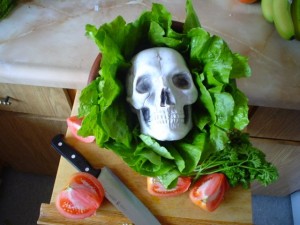 We conducted 2 analytical studies: a case–control study for outbreak A and a cohort study for outbreak B. We tested microbiological and environmental samples, including by using whole-genome sequencing. For both outbreaks combined, we identified 157 probable case-patients; 27 were laboratory-confirmed as EIEC O96:H19–positive. Combined epidemiologic, microbiological, and environmental findings implicated lettuce as the vehicle of infection in outbreak A, but the source of the organism remained unknown. Whole-genome sequencing identified the same organism in cases from both outbreaks, but no epidemiologic link was confirmed.
We conducted 2 analytical studies: a case–control study for outbreak A and a cohort study for outbreak B. We tested microbiological and environmental samples, including by using whole-genome sequencing. For both outbreaks combined, we identified 157 probable case-patients; 27 were laboratory-confirmed as EIEC O96:H19–positive. Combined epidemiologic, microbiological, and environmental findings implicated lettuce as the vehicle of infection in outbreak A, but the source of the organism remained unknown. Whole-genome sequencing identified the same organism in cases from both outbreaks, but no epidemiologic link was confirmed.
These outbreaks highlight that EIEC has the capacity to cause large and severe gastrointestinal disease outbreaks and should be considered as a potential pathogen in foodborne outbreaks in Europe.
Two linked enteroinvasive Escherichia coli outbreaks, Nottingham, UK, June 2014
Emerging Infectious Diseases, Volume 22, Number 7, July 2016, DOI: 10.3201/eid2207.152080
Newitt, V. MacGregor, V. Robbins, L. Bayliss, M.A. Chattaway, T. Dallman, D. Ready, H. Aird, R. Puleston, J. Hawker
Read this Packer story from 2013 for the convoluted hoops public health types are faced with while investigating foodborne illness outbreaks. And now the scientific report: same hoops, same dance, same unsatisfactory outcome for consumers who want to know what’s safe.
 A regional, multistate investigation into a June–August 2013 cyclosporiasis outbreak was conducted in Nebraska, Iowa, and neighbouring states. Cases were confirmed on the basis of laboratory and clinical findings.
A regional, multistate investigation into a June–August 2013 cyclosporiasis outbreak was conducted in Nebraska, Iowa, and neighbouring states. Cases were confirmed on the basis of laboratory and clinical findings.
Of 227 cases in Iowa (n = 140) and Nebraska (n = 87) residents, 162 (71%) reported dining at chain A/B restaurants – 96% reported house salad consumption. A case-control study identified chain A/B house salad as the most likely vehicle. Traceback was conducted to ascertain production lot codes of bagged salad mix (iceberg and romaine lettuce, red cabbage, and carrots) served as house salad in implicated restaurants. A single production lot code of salad mix supplied by both a common producer and distributor was linked to the majority of confirmed cases in persons reporting regional chain A/B exposure.
The salad mix linked to illnesses contained imported romaine lettuce from two separate single-grower fields-of-origin and ≥1 additional field from another grower.
Regional investigation of a cyclosporiasis outbreak linked to imported romaine lettuce – Nebraska and Iowa, June–August 2013
Epidemiology and Infection / Volume 144 / Issue 09 / July 2016, pp 1807-1817Copyright © Cambridge University Press 2015 DOI: http://dx.doi.org/10.1017/S0950268815002484 (About DOI), Published online: 22 October 2015
F. Buss, M. V. Joshi, A. L. O’keefe, C. D. Allensworth, A. Garvey, K. Obbink, S. Mandernach And T. J. Safranek
More than 400 people have been sickened by norovirus in Denmark by lettuce from France.
Cheese whey fermented by an industrial starter consortium of lactic acid bacteria was evaluated for its antibacterial capacity to control a selection of pathogenic bacteria. For their relevance on outbreak reports related to vegetable consumption, this selection included Listeria monocytogenes, serotype 4b, Escherichia coli O157:H7, and Salmonella Goldcoast.
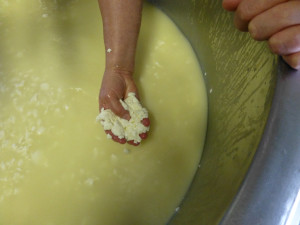 Organically grown lettuce was inoculated with an inoculum level of ∼107 colony-forming unit (CFU)/mL and was left for about 1 h in a safety cabinet before washing with a perceptual solution of 75:25 (v/v) fermented whey in water, for 1 and 10 min. Cells of pathogens recovered were then counted and their number compared with that obtained for a similar treatment, but using a chlorine solution at 110 ppm.
Organically grown lettuce was inoculated with an inoculum level of ∼107 colony-forming unit (CFU)/mL and was left for about 1 h in a safety cabinet before washing with a perceptual solution of 75:25 (v/v) fermented whey in water, for 1 and 10 min. Cells of pathogens recovered were then counted and their number compared with that obtained for a similar treatment, but using a chlorine solution at 110 ppm.
Results show that both treatments, either with chlorine or fermented whey, were able to significantly reduce (p < 0.05) the number of bacteria, in a range of 1.15–2.00 and 1.59–2.34 CFU/g, respectively, regarding the bacteria tested. Results suggest that the use of fermented whey may be as effective as the solution of chlorine used in industrial processes in reducing the pathogens under study (best efficacy shown for Salmonella), with the advantage of avoiding health risks arising from the formation of carcinogenic toxic chlorine derivates.
Preliminary study on the effect of fermented cheese whey on Listeria monocytogenes, Escherichia coli O157:H7, and Salmonella Goldcoast populations inoculated onto fresh organic lettuce
Maria I.S. Santos,1,2,3,4 Ana I. Lima,4 Sara A.V.S. Monteiro,4 Ricardo M.S.B. Ferreira,4 Laurentina Pedroso,3 Isabel Sousa,2 and Maria A.S.S. Ferreira1
1Microbiology Laboratory, Department of Natural Resources, Environment and Territory, DRAT, LEAF, Instituto Superior de Agronomia, Universidade de Lisboa, Lisbon, Portugal.
2Eco-Processing of Food and Feed, CEE, LEAF, Instituto Superior de Agronomia, Universidade de Lisboa, Lisbon, Portugal.
3Faculty of Veterinary Medicine, Universidade Lusofona de Humanidades e Tecnologias, Lisbon, Portugal.
4Disease & Stress Biology, DRAT, LEAF, Instituto Superior de Agronomia, Universidade de Lisboa, Lisbon, Portugal.
Foodborne Pathogens and Disease, doi:10.1089/fpd.2015.2079
We investigated a nationwide outbreak of Salmonella Coeln in Norway, including 26 cases identified between 20 October 2013 and 4 January 2014. We performed a matched case-control study, environmental investigation and detailed traceback of food purchases to identify the source of the outbreak.
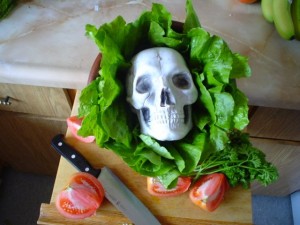 In the case-control study, cases were found to be more likely than controls to have consumed a ready-to-eat salad mix (matched odds ratio 20, 95% confidence interval 2·7–∞). By traceback of purchases one brand of ready-to-eat salad was indicated, but all environmental samples were negative for Salmonella.
In the case-control study, cases were found to be more likely than controls to have consumed a ready-to-eat salad mix (matched odds ratio 20, 95% confidence interval 2·7–∞). By traceback of purchases one brand of ready-to-eat salad was indicated, but all environmental samples were negative for Salmonella.
This outbreak underlines that pre-washed and bagged salads carry a risk of infection despite thorough cleaning procedures by the importer. To further reduce the risk of infection by consumption of ready-to-eat salads product quality should be ensured by importers.
Outbreaks linked to salads reinforce the importance of implementation of appropriate food safety management systems, including good practices in lettuce production.
Are ready-to-eat salads ready to eat? An outbreak of Salmonella Coeln linked to imported, mixed, pre-washed and bagged salad, Norway, November 2013
F. Vestrheima1a2 c1, H. Langea1a3, K. Nygårda1, K. Borgena1, A. L. Westera1, M. L. Kvarmea4 and L. Volda1
Epidemiology and Infection, Volume 144, Issue 8, June 2016, pages 1756-1760, DOI: http://dx.doi.org/10.1017/S0950268815002769
Beginning August 2, 1998, over 80 Americans fell ill, 15 were killed, and at least six women miscarried due to listerosis. On Dec. 19, 1998, the outbreak strain was found in an open package of hot dogs partially consumed by a victim. The manufacturer of the hot dogs, Sara Lee subsidiary Bil Mar Foods, Inc., quickly issued a recall of what would become 35 million pounds of hot dogs and other packaged meats produced at the company’s only plant in Michigan. By Christmas, testing of unopened packages of hot dogs from Bil Mar detected the same genetically unique L. monocytegenes bacteria, and production at the plant was halted.
 A decade later, the deaths of two Toronto nursing home residents in the summer of 2008 were attributed to listeriosis infections. These illnesses eventually prompted an August 17, 2008 advisory to consumers by the Canadian Food Inspection Agency (CFIA) and Maple Leaf Foods, Inc. to avoid serving or consuming certain brands of deli meat as the products could be contaminated with L. monocytogenes. When genetic testing determined a match between contaminated meat products and listeriosis patients, all products manufactured at a Toronto Maple Leaf Foods plant were recalled and the facility closed. An investigation by the company determined that organic material trapped deep inside the plant’s meat slicing equipment harbored L. monocytogenes, despite routine sanitization that met specifications of the equipment manufacturer. In total, 57 cases of listeriosis as well as 22 deaths were definitively connected to the consumption of the plant’s contaminated deli meats.
A decade later, the deaths of two Toronto nursing home residents in the summer of 2008 were attributed to listeriosis infections. These illnesses eventually prompted an August 17, 2008 advisory to consumers by the Canadian Food Inspection Agency (CFIA) and Maple Leaf Foods, Inc. to avoid serving or consuming certain brands of deli meat as the products could be contaminated with L. monocytogenes. When genetic testing determined a match between contaminated meat products and listeriosis patients, all products manufactured at a Toronto Maple Leaf Foods plant were recalled and the facility closed. An investigation by the company determined that organic material trapped deep inside the plant’s meat slicing equipment harbored L. monocytogenes, despite routine sanitization that met specifications of the equipment manufacturer. In total, 57 cases of listeriosis as well as 22 deaths were definitively connected to the consumption of the plant’s contaminated deli meats.
As far back as 2013, Blue Bell ice cream was finding Listeria in places like floors, catwalks and cleaning tubs. Blue Bell had positive listeria findings from at least 11 swabs of plant surfaces between March 2013 and November 2014. Each time, it vigorously cleaned the area, and moved on without testing the equipment that touches the ice cream. At the same time, Blue Bell had problems with the layout of its plants, with condensation dripping all over the place. After federal officials linked an illness outbreak to Blue Bell in 2015, they tested the company’s food processing equipment and found LM. Three people died and 10 were sickened.
In all three Listeria outbreaks, the companies had data that showed an increase in Listeria-positive samples.
But rather than pay attention, they ignored the safety.
Those who study engineering failures –the BP oil well in the Gulf, the space shuttle Challenger, Bhopal – say the same thing: human behavior can mess things up.
 In most cases, an attitude prevails that is, “things didn’t go bad yesterday, so the chances are, things won’t go bad today.”
In most cases, an attitude prevails that is, “things didn’t go bad yesterday, so the chances are, things won’t go bad today.”
And those in charge begin to ignore the safety systems.
Or hope the problem will just go away.
Kellogg’s was taking Salmonella-contaminated peanut paste based on paperwork in 2009? Pay attention, Nestle did.
In 2009, the operator of a yakiniku barbecue restaurant chain linked to four deaths and 70 illnesses from E. coli O111 in raw beef in Japan admitted it had not tested raw meat served at its outlets for bacteria, as required by the health ministry.
“We’d never had a positive result [from a bacteria test], not once. So we assumed our meat would always be bacteria-free.”
Chipotle Mexican Grill was aware of a norovirus outbreak among people who had eaten in one of its restaurants in Simi Valley, Calif., but did not tell public health officials there until after it had closed and cleaned the restaurant. More than 200 people were sickened.
So it’s no surprise that officials at Dole’s Springfield, Ohio plant, which bags lettuce and other supposedly healthy meals, knew about Listeria in its facility for 18 months before shutting down and issuing a recall.
Four people have died and 33 sickened in Canada and the U.S. from Listeria in the Dole products.
Kudos to Bill Marler and his Food Safety News, as well as Food Poisoning Bulletin, for filing the Freedom of Information request on U.S. Food and Drug Administration inspections at the Dole plant and putting together a preliminary picture of who knew what when.
Inspection reports (483) obtained by Food Safety News revealed the timeline of positive Listeria results and inaction. Dole Fresh Vegetables Inc. finally suspended production at its salad plant in Springfield, OH, on Jan. 21 this year after a random test by state officials showed a bagged salad contained Listeria monocytogenes.
Dole restarted production at the plant in Springfield, OH, on April 21. Company officials won’t say what was done to clean the plant or how they plan to prevent future contamination there.
 Inspectors from FDA checked the production plant three times in January and twice in February after genetic fingerprinting showed the undeniable link between the sick people and salads from the facility. They collected swab samples, unfinished product samples, testing records and other documents and information.
Inspectors from FDA checked the production plant three times in January and twice in February after genetic fingerprinting showed the undeniable link between the sick people and salads from the facility. They collected swab samples, unfinished product samples, testing records and other documents and information.
According to the FDA’s inspection reports, in July 2014 Dole did swab tests of surfaces in the Springfield plant. The tests returned positive results for Listeria, but the facility kept producing salads, shipping them to dozens of states and at least five Canadian provinces.
At least five more times in 2014 and three times in late 2015 Dole’s internal tests showed Listeria contamination, but Dole kept the salad lines kept rolling until January this year.
The FDA inspection report states that Dole’s vice president for quality assurance and food safety, as well as the company’s quality assurance manager, were aware internal tests on Jan. 5 and 7 this year showed Listeria on equipment and other surfaces in the plant. But Dole continued to produce and ship salads.
The plant kept operating until Jan. 21. The following day Dole posted a recall notice with the FDA and the Canadian Food Inspection Agency (CFIA) for salads produced at the Springfield facility. Dole branded salads and house brands for Walmart, Kroger, Loblaws and Aldi were included in the recall.
Marler, a prominent food safety lawyer who represents one of the victims in a lawsuit against Dole told Stephanie Strom of the N.Y. Times, “If the government inspectors hadn’t showed up, who knows when or if they were going to tell anyone.”
“They’d been having positive tests for listeria for some time,” said William Goldfield, a spokesman for Dole. “We understand these recent news reports may raise questions among our consumers and customers. They should be assured, however, that we have worked in conjunction with the F.D.A. to address those observations and ensure that Dole products are safe.”
Lauren Sucher, a spokeswoman at the F.D.A., said that companies must notify the agency when they find a food has a “reasonable probability” of causing serious adverse health consequences.
But, Ms. Sucher said, not all strains of listeria cause disease. “When listeria is found in the manufacturing environment, rather than on the food itself, it is not uncommon for a company to immediately take corrective action rather than test further to see if the strain of listeria poses a threat,” she wrote in an email.
Food companies that find listeria during periodic testing are not required to run further tests to determine whether the pathogen is of a toxic variety.
In Dole’s case, it was swabbing various locations in its plant in Springfield, Ohio, not necessarily testing the finished products, according to the F.D.A. inspection. Rather, Canadian public health officials investigating an outbreak of listeriosis dating to summer 2015, tested bagged Dole salads and found four varieties that were contaminated.
I’ve been sitting on this for a week now, naively hoping there would be further information from lettuce producers, processors and health types.
 And then I remembered this is Australia, where information on foodborne outbreaks disappears into a black hole, maybe to reappear in court a couple of years later, maybe not.
And then I remembered this is Australia, where information on foodborne outbreaks disappears into a black hole, maybe to reappear in court a couple of years later, maybe not.
Nothing since.
The outbreak, which has been traced back to Tripod Farmers salad ingredients, has generated lots of discussion about supporting farmers and almost nothing about the sick people.
Bulmer Farms managing director Andrew Bulmer, who farms at Lindenow in East Gippsland, said he had seen demand drop back by 30 to 40 per cent, even though his business was not linked to the outbreak and that, “They’re 100 per cent safe and people should have confidence.” Bulmer Farms managing director Andrew Bulmer, who farms at Lindenow in East Gippsland, said he had seen demand drop back by 30 to 40 per cent, even though his business was not linked to the outbreak.
Mr. Bulmer said it had been a big hit during their busiest season.
“We supply a lot of raw product into processing companies that then put bagged product on shelves in supermarkets and we’ve seen a 30 to 40 per cent downturn in that business with demand for raw products into those processors,” he said.
“I’d expect it’d be another couple of weeks until it dies down a little bit and consumers regain the confidence to go back out and buy the washed salads which, by the way are ready to go as of now.
“They’re 100 per cent safe and people should have confidence.”
Why?
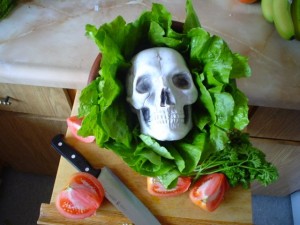 What are the safety protocols on Victorian lettuce farms? How often is irrigation water tested? What kind of soil amendments are used (poop)? Is there any end-product testing to verify systems are working? Is there a rigorous employee handwashing and sanitation program? Are all of these steps verified? Does management instill a culture of food safety first?
What are the safety protocols on Victorian lettuce farms? How often is irrigation water tested? What kind of soil amendments are used (poop)? Is there any end-product testing to verify systems are working? Is there a rigorous employee handwashing and sanitation program? Are all of these steps verified? Does management instill a culture of food safety first?
There is no such thing as 100% safe.
But reasonable steps can be taken to reduce risk.
And producers, don’t leave it to health types to inform the public. They’ll still have their jobs and supers after the outbreak. If you, as a producer, are doing the right thing, go and brag about it.
This is how bad public reporting of foodborne illness is in Australia.
 Retailers, even with crappy Internet, we have cameras, and you’ll be found out.
Retailers, even with crappy Internet, we have cameras, and you’ll be found out.
An increasing number of Queenslanders claim they’ve been made ill from supermarket-bought salads in the wake of salmonella outbreak, but Woolworths and Coles insist there’s no problem with Queensland supply.
“The supplier in question does not supply into Queensland so there is no need to worry,” a Woolworths spokesman told The Courier-Mail.
While a Cole statement confirmed: “None of the recalled products are sold in Queensland, there is no cause for concern.”
It is believed Coles and Woolworths have stopped taking supplies from Tripod indefinitely.
Chelsea Bienke is just one of Queensland consumers who believe a bout of extreme vomiting and diarrhea was sparked after eating Woolworths lettuce.
The Brisbane woman and her sister were extremely ill for days after eating a meal with mixed salad.
“We had diarrhea for days and I was vomiting” Ms Bienke said.
“I felt like complete crap. I couldn’t go to work this week.”
She said she doubted claims that the product wouldn’t affect any customers.
“Well it’s strange how we bought the product last week and by Tuesday we were vomiting and had diarrhea,” Ms Bienke said.
“My niece who doesn’t eat the product is perfectly fine.”
Another Queenslander wrote on Coles’ Facebook page: “Are you sure Qld products are not affected. I bought spinach and rocket mix. My child has been unwell for three days.”
Another Brisbane mum posted on the same page: “You say Qld isn’t affected but my kids have been sick with headache and nausea. We eat your salads all the time and five of my six kids have been sick.
An urgent national recall has been issued for pre-packaged lettuce and salad linked to a salmonella outbreak that has hospitalized two people.
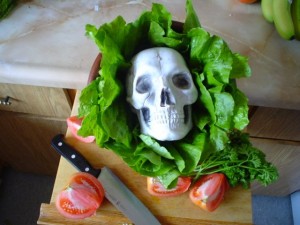 The Victorian Department of Health and Human Services said it had identified a number of cases of the infection linked to lettuce grown and packaged by Victorian company Tripod Farmers.
The Victorian Department of Health and Human Services said it had identified a number of cases of the infection linked to lettuce grown and packaged by Victorian company Tripod Farmers.
It is sold at Coles, Woolworths, Bi-Lo and other grocers as Coles 4 Leaf Mix, Woolworths salad mix, SupaSalad Supamix and Wash N Toss salad mix.
The affected products have best before dates leading up to and including February 14 and are in all states and territories except for Tasmania and Western Australia.
The health department identified the lettuce after recording an unusually high level of Salmonella Anatum strain infections and traced a number of those back to the products.
“Normally we only see a handful of cases of this strain each year, but so far this year there have been 28 adult cases of salmonella anatum – mostly adults – notified to the department,” the department’s senior medical advisor Dr Finn Romanes said.
“As a result of following up the food histories of a number of people we have discovered a common source – the Tripod Farmers lettuce.
“Tests of three products from two batches have also tested positive for Salmonella Anatum bacterium.”
“We do expect to see more cases,” he said.
“We are working with the company to understand what may have occurred… They have instituted a comprehensive clean-up to make sure any risk is minimized.”